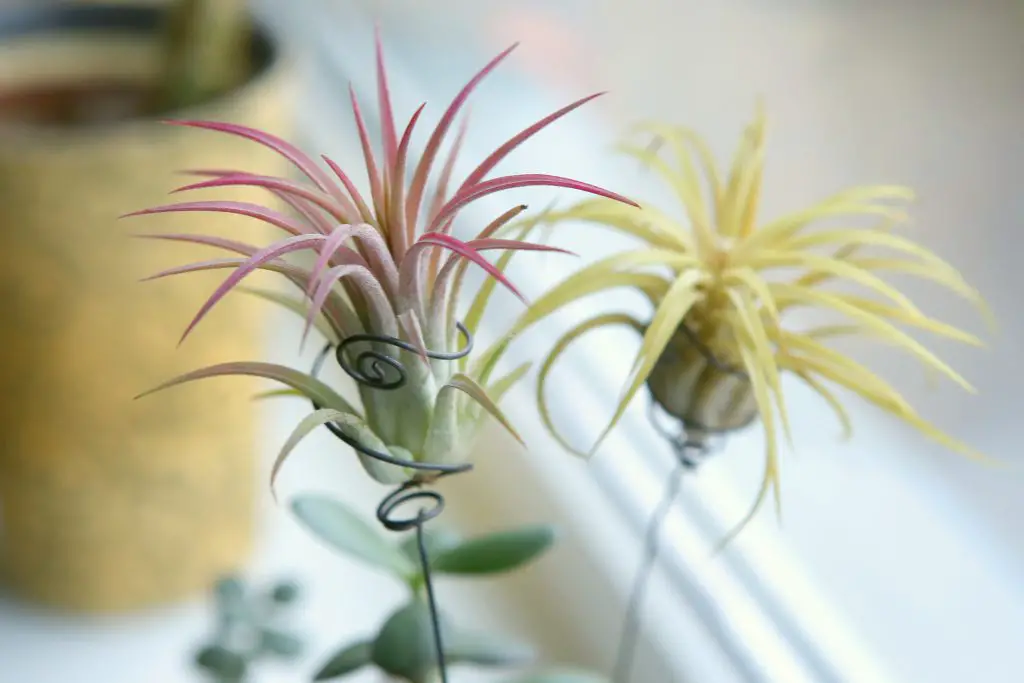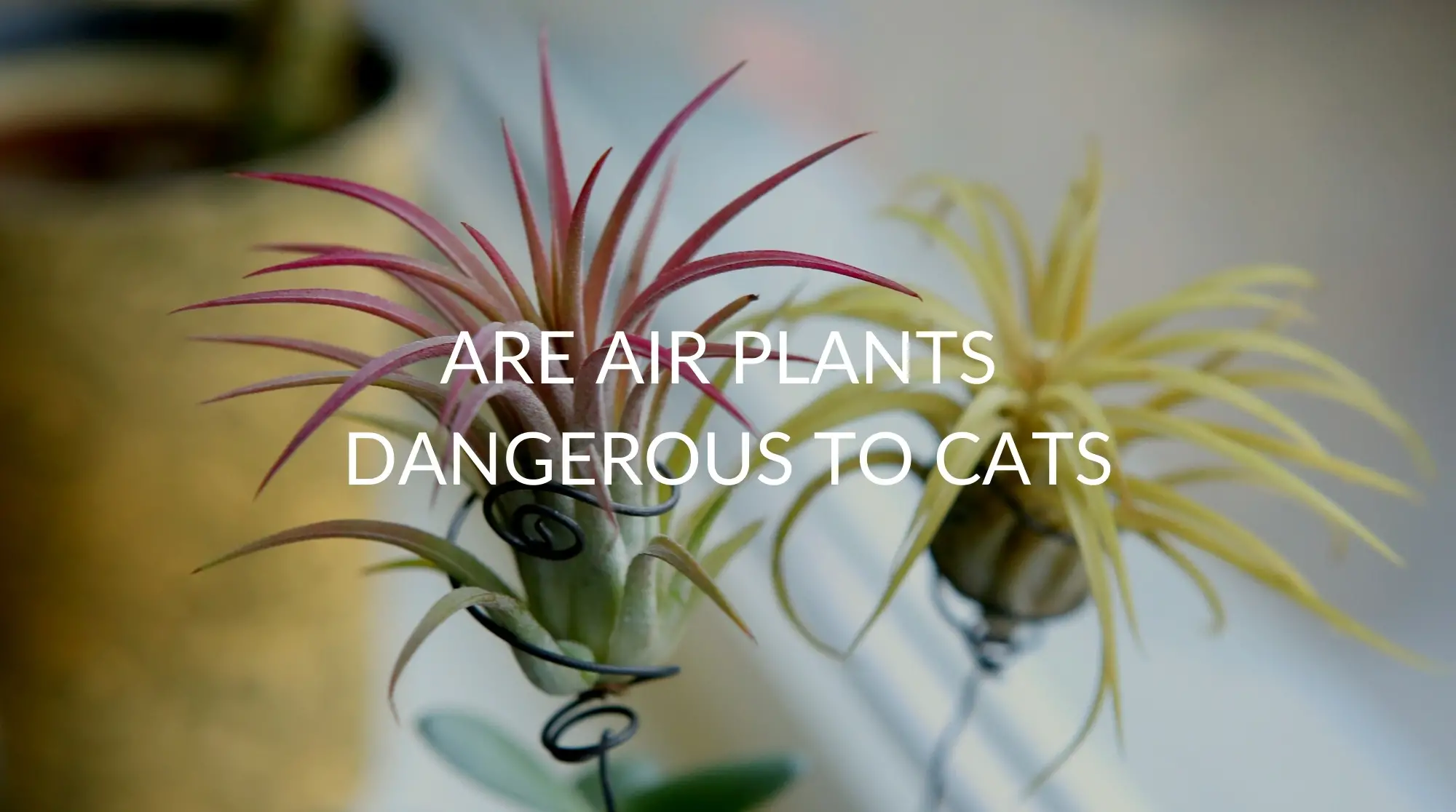There are about 400 distinct varieties of air plants, none of which are harmful to humans or animals. As a result, your cats, dogs, and other furry pets will be safe with these plants. However, because air plants contain sharp and pointed leaves that might induce choking, you should keep them out of their reach.
Continue reading to find out if air plants are harmful to cats, how to keep air plants out of your cat’s reach, what to do if your cat nibbles on your air plants, and more.
Are Air Plants Toxic to Animals?
The good news is that cats and dogs are unaffected by air plants. However, bear in mind that while air plants are generally healthy for pets, your cats and dogs may not be kind to your air plants.
Air plants come in roughly 400 different types, none of which are toxic to humans or animals. As a consequence, these plants are safe for your cats, dogs, and other furry companions. Air plants, on the other hand, have sharp and pointed leaves that might cause choking, so keep them out of their reach.
Many pets like chewing on houseplants, particularly those with succulent leaves. Keeping your cats and other furry friends away from air plants is always a good idea. In order to do this, place your air plants on a shelf or hang them from a ceiling. Hanging air plant jellyfish, for example, can be hung near a window or anywhere out of reach of your dogs.
Are Air Plants Toxic to Cats?
Like all other genera in the Bromeliaceae family of bromeliads, air plants are neither poisonous nor hazardous to cats. As a result, they make excellent houseplants, especially if your cats enjoy chewing on greenery, such as houseplants.
Air plants, it turns out, are really beneficial to have near cats. They have a variety of health advantages and are housed in terrariums, which are relatively protected from curious paws. Air plants are also safe for cats, which is an added plus.

Why Do Cats Love Air Plants?
Cats Are Known to Use Their Mouth and Tongue as a Way to Explore
Your cat’s mouth is one of the ways it explores the world. Like newborns, Cats tend to taste their way around the world, putting items in their mouths that aren’t supposed to be there. Perhaps the aroma of your air plants piques the kitty’s interest and entices them to try a bite.
Once they’ve had a taste of anything they enjoy, Cats will go for it again and again, whether or not it’s beneficial for them. While air plants are not hazardous to cats, some of the plants in your house might be highly deadly if your cat eats them. Lilies and orchids, for example, are incredibly poisonous to cats, causing vomiting and other serious responses.
Cats Will Attack Air Plants Out of Boredom
Boredom is another factor that might lead to a cat eating plants. If your cat is left alone for several hours a day with no other stimulus, they will most certainly get into a variety of items, including your air plants.
Boredom may be alleviated by providing your cat with a stimulating environment, which could include some cat-friendly plants. Finding methods to activate your cat’s hunting and climbing instincts will also give cerebral stimulation.
Cats Are Attracted to Movement
Movement is another behavior-based reason why your cat can be drawn to specific plants. Your cat would be drawn to a plant with tempting extensions, such as an air plant. Those green shoots may appear to be incredibly scrumptious when they sway softly in the breeze, generating an alluring movement for felines. Fortunately, if your cat eats the air plant, it will not harm them.
Why Should You Keep Air Plants Away from Cats?
Air Plants Pose a Choking Hazard to Cats
While air plants are not dangerous to animals and will not harm them if they nibble on the leaves, it is still a good idea to keep these plants out of their reach. This is because air plants can still pose a choking threat, especially to smaller animals like cats.
Air Plants Are Sharp and Pointy and Can Cause Injury to Your Cat
Air plant leaves are sharp, stiff, elongated, and pointed. As a result, if your cat consumes it, it may become caught in its throats. Because of the hard surface of the plant, playing with air plant leaves might harm your pet’s eyes, mouth, and paws. As a result, to minimize anxieties or accidents, keep your cat away from your air plants.
Your Cat Can Injure or Kill Your Air Plant
When your cat plays with or chews on some or all of your air plants’ leaves, your plant can, in turn, become frightened. When your air plant goes into a state of shock, this can affect the overall health of your plant.
Constant disturbances and damage to the plant will eventually cause the plant to die. To keep both your plant and furry friends safe, it is best to keep the two separated.
What To Do If Your Cat Nibbles on Your Air Plants?
Examine Your Cat
If you suspect your cat has swallowed some of your air plants, keep an eye on them to verify, the plant pieces have been devoured and are not caught in their throat. Due to the rigidness of the plant’s exterior, worst-case scenario, the air plant’s leaves have gotten stuck in your feline’s throat.
Since air plants are not known to be hazardous to cats, they should be fine as long as your feline buddy does not choke.
Examine the Damage and Care for Your Air Plant
Examine your plant to see if it still has enough leaves and if the base or main stem is still intact. If your plant has been crushed and all of its leaves have been removed, it has a minimal chance of survival. You can, however, continue to wait and see what occurs.
With a pair of garden shears, clip off the tips of the damaged leaves to revive your plant. Remember only to cut the damaged portions. Even though the remaining leaves will only be half as long as they used to be, your air plant still needs these leaves to withstand the stress and stay alive. Remember that air plants use their leaves to absorb water and nutrients.
Move Your Plant to a New Location
Once you’ve checked to make sure both your cat and the air plant are okay, you need to consider moving your plant to a new location to avoid your cat repeating the process of consuming the plant. Choose a place where your cat and other furry friends will not have access.
This can include in a glass terrarium, high on a shelf, hanging out of reach, or on live display like a piece of driftwood. However, since each individual cat is different, owners will need to take the time to see which option deters their cat from attacking their air plants the most.
How To Keep Your Air Plants Out of Your Cat’s Reach?
Hanging Air Plants Away from Cats
You may hang your air plant with nylon string, fishing line, or wire in order to keep it out of your cat’s reach. Hang hooks from the ceiling or above the window. With your tillandsias on the other end, tie the pieces of chopped wire or string to these hooks.
Air plants can also be hung from tree branches in your landscape. Simply ensure your plants are hanging at a height that your pets cannot reach even if they jump.
Place Your Air Plants in a Glass Terrarium on a High Shelf
Since air plants require sufficient air circulation, an open terrarium is an excellent option to house your plants and keep them out of your cat’s reach. Take note to use a glass with a smaller opening so that your pet cannot reach the plant. Alternatively, put it somewhere where your pet won’t be able to knock it off and break the glass.
A Live Frame or Piece of Driftwood Can Also Be Used to Hold Your Air Plants
Hang your air plants on the wall in a wreath, a piece of driftwood, or a live frame made of chicken wire. This will not only keep your air plants secure and out of reach of your cats and other pets, but it will also look gorgeous on your wall.
Recap
No air plant species are known to be toxic to humans or animals. As a result, they make ideal houseplants for pet owners. However, because of the form and texture of their leaves, they might still constitute choking dangers. However, although your tillandsias may be safe for your pets, your pets may not be safe for your tillandsias.
As a result, it’s crucial to be careful and keep your air plants out of reach of your pets. Overall, it’s best to keep your air plants away from your cats by hanging them, putting them in a glass terrarium, or displaying them on driftwood.

